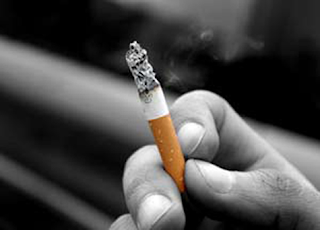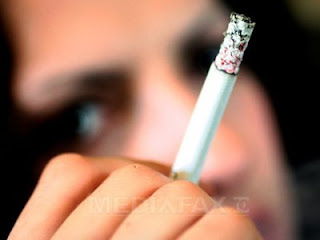
Students younger than 18 who bring tobacco to East or West Jessamine high schools in Nicholasville can find themselves paying a steep price.
Literally.
School resource officers at the two Jessamine County high schools now issue citations to underage students if they are caught with cigarettes or tobacco products on school property. The tickets are referred to Jessamine County Juvenile Court, where students can face fines of as much as $150 for violations, Jessamine Superintendent Lu Young said.
Citations are issued to enforce Kentucky state law that prohibits possession of tobacco products by anyone younger than 18. Fines are paid to the court and don't go to the school system, Young said.
Students 18 and older can't be ticketed for tobacco violations, but they can receive administrative punishment from the school system, Young said.
East Jessamine High began issuing tickets to tobacco violators at the start of the previous school year, and West Jessamine High started last month. District officials said both schools have seen a sharp drop in cases of students bringing tobacco on campus.
Before the policy went into effect, East Jessamine had 120 incidents of students smoking in 2008-09 and 148 in 2009-10, Principal Janet Granada said.
"Last year, we only had 39," Granada said. "Once the word spreads that there's a fine involved, it seems to lessen smoking greatly."
Young says the intent is to reduce student smoking, not punish students.
"We're not about fining kids or busting kids and that sort of thing," she said. "But these deterrents are there for a reason.
"And if it can become the ticket that moves a kid toward smoking cessation, then that's a win for us."
Brad Hughes, a spokesman for the Kentucky School Boards Association, said other Kentucky school districts might be taking such steps to combat smoking, but he hasn't heard of any. State Education Department spokeswoman Lisa Gross also said this is the first she has heard of school officers ticketing underage students for having tobacco on school property.
Federal law generally prohibits tobacco in any building used for educational purposes but doesn't cover outdoor smoking on school property.
Many of Kentucky's 174 public school districts, including Jessamine County, have adopted tobacco-free policies on their campuses. Fayette County Public Schools prohibit cigarettes and tobacco products in buildings, on grounds, in school-owned vehicles and on field trips.
Presumably, however, any public school district could adopt a court-based approach like the one at East and West Jessamine.
The Jessamine County effort is the brainchild of Billy King, a school resource officer at East Jessamine High. School resource officers in the Jessamine County system are official members of the Nicholasville police.
"We recognized we had a problem with minors using tobacco," King said. "We talked with faculty members and also with the court system, and we decided that I would make it a rule that if students were caught in possession of tobacco on campus, they would receive citations.
"I felt that it would prevent them from bringing tobacco to school if they knew they could get a fine. But I also knew that they probably didn't think it would happen. Police generally don't cite juveniles for tobacco possession, even though the law has been on the books forever."
King said he first posted signs around the school warning that citations would be issued to any minors who were caught with tobacco. After waiting a few weeks for students to get the picture, he started issuing tickets.
"The word got around pretty quickly that the court system was putting some pretty big penalties on the violators," he said.
Young said she didn't know exactly how many students have been fined, but that the number is relatively small.
"They only had to fine a couple of students at East High before the kids were saying, 'Forget it,'" she said. "Now, they're applying the same thing at West High too, and apparently it's gotten some quick reaction there as well."
Asked whether parents end up paying the fines, Young said that many students now have part-time jobs and could pay the fines themselves. Individual families would decide how they want to handle it, she said.
King said he understands that the court has required students, not parents, to pay the fines. He said, however, that fines are not imposed in every case.
Young said the school district is trying to support the effort with smoking-cessation classes for students who want help.
"The kids who don't smoke say they're really annoyed when they have to use bathrooms that smell like smoke," she said. "This is another weapon to try and cut out smoking in the high schools. I'm hoping it's going to be successful."































